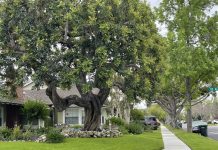Dear Editor,
I would like to respond to the letter published by former LAUSD school board president Dr. Jeff Barke. Dr. Barke served the Los Alamitos School District as a member of the school board for twelve years, an impressive feat and a position that garnishes a lot of trust. At first glance, Dr. Barke may seem like the right person for this discussion on the ethnic studies course. I’ll admit, I voted for him for his last term on the school board, however I didn’t understand Dr. Barke until recently and his ideology. So before we give too much weight to Dr. Barke, let’s take a further in depth look into his ideology and what he has to say on the matter.
Let’s start off with the material for the course. For some reason, I keep on seeing Dr. Christine Sleeter brought up yet I couldn’t immediately find anything about her. It took me a while to find any mention of her as the course outline and the reading materials for the ethnic studies course found on the school district website makes no mention of her. Eventually I found this mention of Dr. Sleeter in the form of a video recording of the LAUSD board meeting on February 9 of this year. I will say it was quite enlightening and the presentation was very well put together. In her presentation, Ondrea Reed outlines the most basic ideals for the ethnic studies course. At approximately minute thirty seven of the board meeting Ms. Reed says a shared quote from Dr. Sleeter and Dr. Miguel Zavala as the quote itself comes from their joint book Transformative Ethnic Studies in Schools: Curriculum, Pedagogy, & Research. The quote Ms. Reed uses is “dismantling hegemonic structures, such as racism, requires naming them, questioning their existence, and then envisioning and working towards alternatives”. Sletter is mentioned again a few minutes later in saying that “participation in ethnic studies courses is significantly and positively related to cognitive development”.
Again Sletter is quoted alongside Dr. Zavala in saying “ethnic studies seeks to rehumanize experiences, challenge problematic Eurocentric narratives, and build community solidarity across difference”. Dr. Barke claims that critical race theory makes up the framework for the ethnic studies course. If that is the case, then why is there no mention of critical race theory if it is such a fundamental concept to the course of ethnic studies? The reason is simple, it isn’t. These are just quotes of Dr. Sleeter. Nothing published by Dr. Sleeter will be used in the course as outlined by the course resources found on the school district’s website. As far as the collaboration between the California Department of Education and the Southern Poverty Law Center for the ethnic studies guidelines, I can’t find any evidence of this. If this collaboration did occur, how is there still no mention of critical race theory if it is so pivotal to the course?
Next we’ll go onto his dismissal of the curriculum. He begins by calling the effort to teach ethnic studies in its current format as “neo-Marxist”. This isn’t the first time that Dr. Sleeter has been referred to as a Marxist in this paper. Maybe I’m just missing it, but I can’t seem to find anywhere where Dr. Sleeter calls for the working class to throw off their shackles and seize the means of production by overthrowing the bourgeoisie.
Dr. Barke follows this up with a statement that a lens of the oppressors and the oppressed is anti-American. The only reason why I can think he would say this is because either Dr. Barke doesn’t believe in oppression in American history, he underplays the value of oppression in American history, or Dr. Barke is fully aware of this and chooses not to include oppression as it would not fit his patriotic viewpoint. We had slavery and fought a war over the institution of it. We created the Chinese Exclusion Act of 1882 which not only prohibited immigration from China, but prevented them from becoming US citizens. In World War II we forced Japanese citizens into internment camps after the bombing of Pearl Harbor. No matter which of the above options Dr. Barke adheres to, he adheres to a stance of ignorance, one that seems to be a running theme in his career.
Dr. Barke claims that “allowing students to determine what curriculum should be taught makes about as much sense as allowing a patient to determine what surgery should be performed…”. Dr. Barke is the type of doctor that when confronted with a patient concerned about being susceptible to coronavirus would give the patient a gun and tell them that’s their best protection. Yet it boggles the mind of Dr. Barke that the education system is failing its students in certain areas. In his statement about the decline in CAASPP scores, Dr. Barke cites the years 2016 and 2018 as years of failure in students’ understanding of math. This just also happens to be towards the tail end of Dr. Barke’s term on the LAUSD school board. The available data on the CAASP’s website only goes as far back as 2014, but it shows that math scores for LAHS have ranged from as low as 49% in 2014 to as high as 59% in 2016. These scores are still a failure and were overseen by school board member, Dr. Jeffery Barke.
Finally, at the end of his letter he brings forth the educational forum that will take place in Rush Park as to the topic of Critical Race Theory. He assures us that the community will be hearing from distinguished experts on the topic. Will we though? In his piece presented in last week’s paper, Dr. Barke says he addresses the facts, but the man lives in a world of fantasy. Dr. Barke seems to disregard experts and peer reviewed studies when it comes to establishing his ideology. He has ignored the scientific community when it comes to the existence of global warming as published by multiple news outlets in May 2011 when he led the charge in teaching the “controversy” on global warming and again he has ignored the scientific community when it comes to the coronavirus in his 2020 interview with Peggy Hall. Can the community be truly sure that this forum will deliver on the promise of experts, or will it end up as an echo tunnel for Dr. Barke and his cronies to repeat the falsehoods he has presented? Dr. Barke worries about critical race theory, but it seems the thing he should be worried about is critical thinking.
Billy Villegas
Los Alamitos












